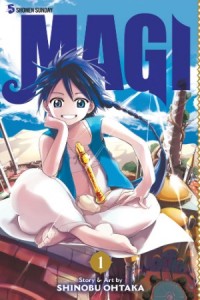By Shinobu Ohtaka. Released in Japan by Shogakukan, serialized in the magazine Shonen Sunday. Released in North America by Viz. Translated by John Werry.
Once again, I finished a volume of Magi and thought about how to convey what I felt about it into a 150-word brief only to realize that I would need a bit more space. And so here we are, with Magi heading into what proved to be its final arc. You get the sense of a lot of strings being drawn back together here, as Sinbad’s ambiguity is becoming a bit less ambiguous – is he going to be the final Big Bad? – and we also get some excellent political drama. And yes, cynical readers will be shaking their heads and saying “you just wanted to gush that another of your ships is canon, didn’t you?”. And there is a bit of that, yes. I have been very fortunate – or perhaps my tastes are merely dull – in that most of my shonen ship preferences have tended to work out over the years. So I am happy to see Alibaba and Morgiana happy, no doubt. But there’s more to this volume.
Shinobu Ohtaka has come a long way as a shonen author from the days when I was reading Sumomomo Momomo and was thoroughly unimpressed. The fight scene that opens this volume is one of the best in the series, with lots of dynamic action and plot twists that are entertaining but don’t verge on ridiculous. It’s always hard to find a way to amp up the drama in scenes like these without heading into meme territory, with “this isn’t even my final form!”, etc. In fact, we even seem to make fun of that sort of thing, as Hakuryu makes a big dramatic deal of being stung by Arba’s possessive scorpion only for it to be him essentially mocking her (and the audience). It also helps that Arba is wearing Hakumei’s body here, as it’s entertaining to see so many insane and evil expressions on such a pretty face.
The second half of the book is romance and politics, as Alibaba and Morgiana reunite (though, in one of the few ‘bad art’ parts of the book, Morgiana looks about twelve years old in the panel where Alibaba sees her) and he almost immediately proposes. It’s a good proposal, as he draws on the fact that peace has returned to the land and many are starting families to express the desire to start his own. We also get judicious flashbacks that show off just how far Morgiana and Alibaba have come from the start of the series (Morgiana also gets in some awesome kicks in the fight scene I mentioned earlier, by the way). Still, the spotlight may be taken away from them a little by Kogyoku, who is struggling with being the leader of the Kou Empire but finds her inner resolve and decides to break away from Sinbad and have the nation struggle on its own. It’s a brave decision, and I suspect Sinbad is really not going to like it.
Magi does not get as much attention as the other big shonen series out there, possibly as it’s in Shonen Sunday and thus couldn’t get the buzz of weekly updates that Jump subscribers get. But it’s really stayed at a high level of quality for some time. With only five volumes to go, readers should look forward to seeing how the series handles its big finish.



